Inclusive Practice: Purpose, Benefits, and Impact on Learning
21 Pages7112 Words61 Views
Added on 2023-01-06
About This Document
This document discusses the concept of inclusive practice in education and training, focusing on its purpose, benefits, and impact on learning. It explores the social and cultural factors that affect learning, as well as the impact of cognitive, physical, and sensory abilities. The document also reviews the policies and legislative frameworks that influence inclusive practices in primary schools.
Inclusive Practice: Purpose, Benefits, and Impact on Learning
Added on 2023-01-06
ShareRelated Documents
Inclusive Practice
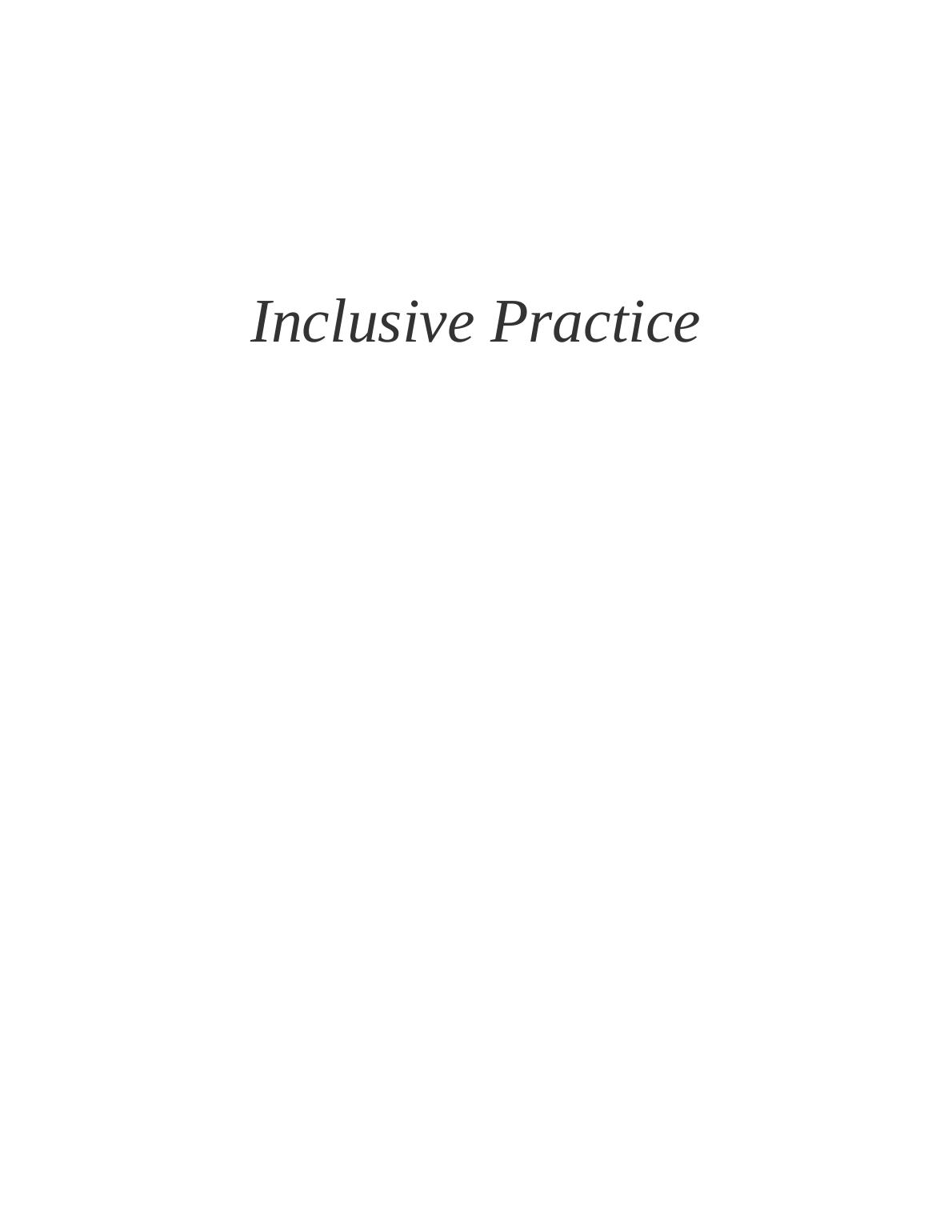
Table of Contents
INTRODUCTION...........................................................................................................................4
TASK 1............................................................................................................................................4
A. Purpose and benefit of inclusive practice related with education and training.................4
B. Explain social and cultural factors that impact on learning...............................................5
Analyse the impact of different cognitive, physical and sensory abilities on learning..........7
TASK 2............................................................................................................................................8
A. Review policies and legislative frameworks that influence a Primary school and teacher's
practice of inclusion...............................................................................................................8
TASK 3..........................................................................................................................................10
A. Purpose of point of referral in meeting the individual needs of learners.......................10
B. Discuss five professionals which a teacher can work with to promote inclusion in Primary
schools..................................................................................................................................11
TASK 4..........................................................................................................................................12
Analyse how a teacher can promote inclusion, equality and value diversity in the classroom.....12
A. Summarise role and responsibilities relating to inclusive practice.................................12
B. Analyse ways to promote equality and value diversity...................................................13
C. Review strategies for effective liaison between professionals involved in inclusive practice
..............................................................................................................................................13
TASK 5..........................................................................................................................................15
Analyse ways of reviewing the effectiveness of inclusive practice in the Primary school and
Identify own strengths and areas for..............................................................................................15
A. Review the effectiveness of own inclusive practice........................................................15
B. Identify own strengths and areas for improvement in relation to inclusive practice.......17
C. Produce an action plan for improvement........................................................................18
CONCLUISON .............................................................................................................................18
REFERENCES .............................................................................................................................19
INTRODUCTION...........................................................................................................................4
TASK 1............................................................................................................................................4
A. Purpose and benefit of inclusive practice related with education and training.................4
B. Explain social and cultural factors that impact on learning...............................................5
Analyse the impact of different cognitive, physical and sensory abilities on learning..........7
TASK 2............................................................................................................................................8
A. Review policies and legislative frameworks that influence a Primary school and teacher's
practice of inclusion...............................................................................................................8
TASK 3..........................................................................................................................................10
A. Purpose of point of referral in meeting the individual needs of learners.......................10
B. Discuss five professionals which a teacher can work with to promote inclusion in Primary
schools..................................................................................................................................11
TASK 4..........................................................................................................................................12
Analyse how a teacher can promote inclusion, equality and value diversity in the classroom.....12
A. Summarise role and responsibilities relating to inclusive practice.................................12
B. Analyse ways to promote equality and value diversity...................................................13
C. Review strategies for effective liaison between professionals involved in inclusive practice
..............................................................................................................................................13
TASK 5..........................................................................................................................................15
Analyse ways of reviewing the effectiveness of inclusive practice in the Primary school and
Identify own strengths and areas for..............................................................................................15
A. Review the effectiveness of own inclusive practice........................................................15
B. Identify own strengths and areas for improvement in relation to inclusive practice.......17
C. Produce an action plan for improvement........................................................................18
CONCLUISON .............................................................................................................................18
REFERENCES .............................................................................................................................19
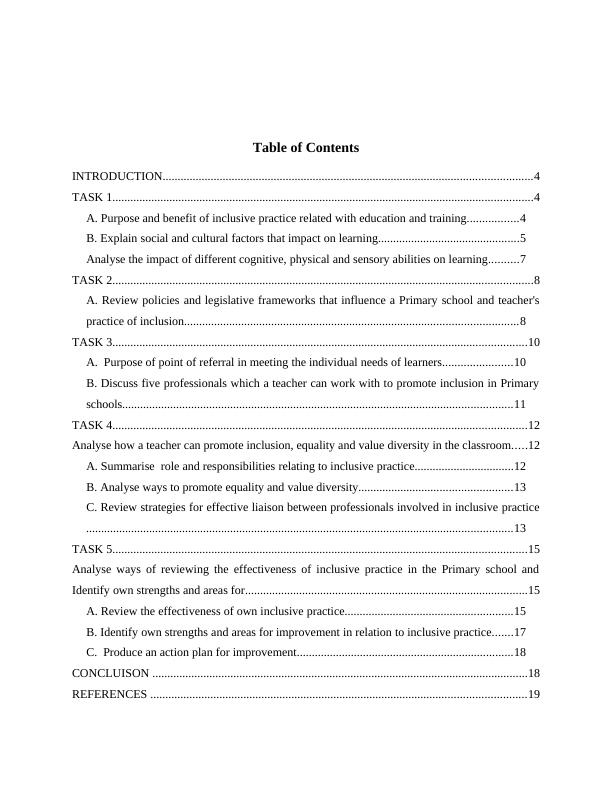
INTRODUCTION
The term inclusive practice is defined as an approach of teaching which aids teacher or
tutor to recognise the diversity aspects among students, enable all students for access of course
content, participate and engagement in learning activities for involvement of persons among
learning with best practices instead of different culture background. In the present scenario,
children are the part of community so with developing the sense of belonging this is easy to
prepare and belong individual with children and adults. All children should offer an equal
opportunity for getting success in education. Regardless of background difference, language
difference and academic ability (Barrett and et. al., 2015). The main role of inclusive practice or
approach is to recognise benefits that student diversity must bring an overall learning experience.
Moreover, this helps for whole range of practice to generate information that makes students to
complete process with teacher and families. Moreover, this report highlights on purpose and
benefit of inclusive practice related with training and education sector. Cultural and social factors
with their impact on the learning aspects will also be included in this report. Cognitive, physical
and sensory abilities related with learning and skills abilities will also focused in the report. With
review of policy and legislative frameworks the influence of Primary school and teacher's
practices for inclusion is focus in the upcoming report.
TASK 1
A. Purpose and benefit of inclusive practice related with education and training
The term inclusive practice is implemented among both sector that include teaching
method as well as educational activity. Inclusive practice leads individuals to teach individuals
about equality and diversity. Student empathy and sensitivity to train them about persons who
arrange individual to train themselves with learning by understand of persons role (Beacham and
McIntosh, 2014). Some purpose and benefit for inclusive practices that is related with training
and education is mention as below:
Purpose
The term inclusive practice is defined as an approach of teaching which aids teacher or
tutor to recognise the diversity aspects among students, enable all students for access of course
content, participate and engagement in learning activities for involvement of persons among
learning with best practices instead of different culture background. In the present scenario,
children are the part of community so with developing the sense of belonging this is easy to
prepare and belong individual with children and adults. All children should offer an equal
opportunity for getting success in education. Regardless of background difference, language
difference and academic ability (Barrett and et. al., 2015). The main role of inclusive practice or
approach is to recognise benefits that student diversity must bring an overall learning experience.
Moreover, this helps for whole range of practice to generate information that makes students to
complete process with teacher and families. Moreover, this report highlights on purpose and
benefit of inclusive practice related with training and education sector. Cultural and social factors
with their impact on the learning aspects will also be included in this report. Cognitive, physical
and sensory abilities related with learning and skills abilities will also focused in the report. With
review of policy and legislative frameworks the influence of Primary school and teacher's
practices for inclusion is focus in the upcoming report.
TASK 1
A. Purpose and benefit of inclusive practice related with education and training
The term inclusive practice is implemented among both sector that include teaching
method as well as educational activity. Inclusive practice leads individuals to teach individuals
about equality and diversity. Student empathy and sensitivity to train them about persons who
arrange individual to train themselves with learning by understand of persons role (Beacham and
McIntosh, 2014). Some purpose and benefit for inclusive practices that is related with training
and education is mention as below:
Purpose
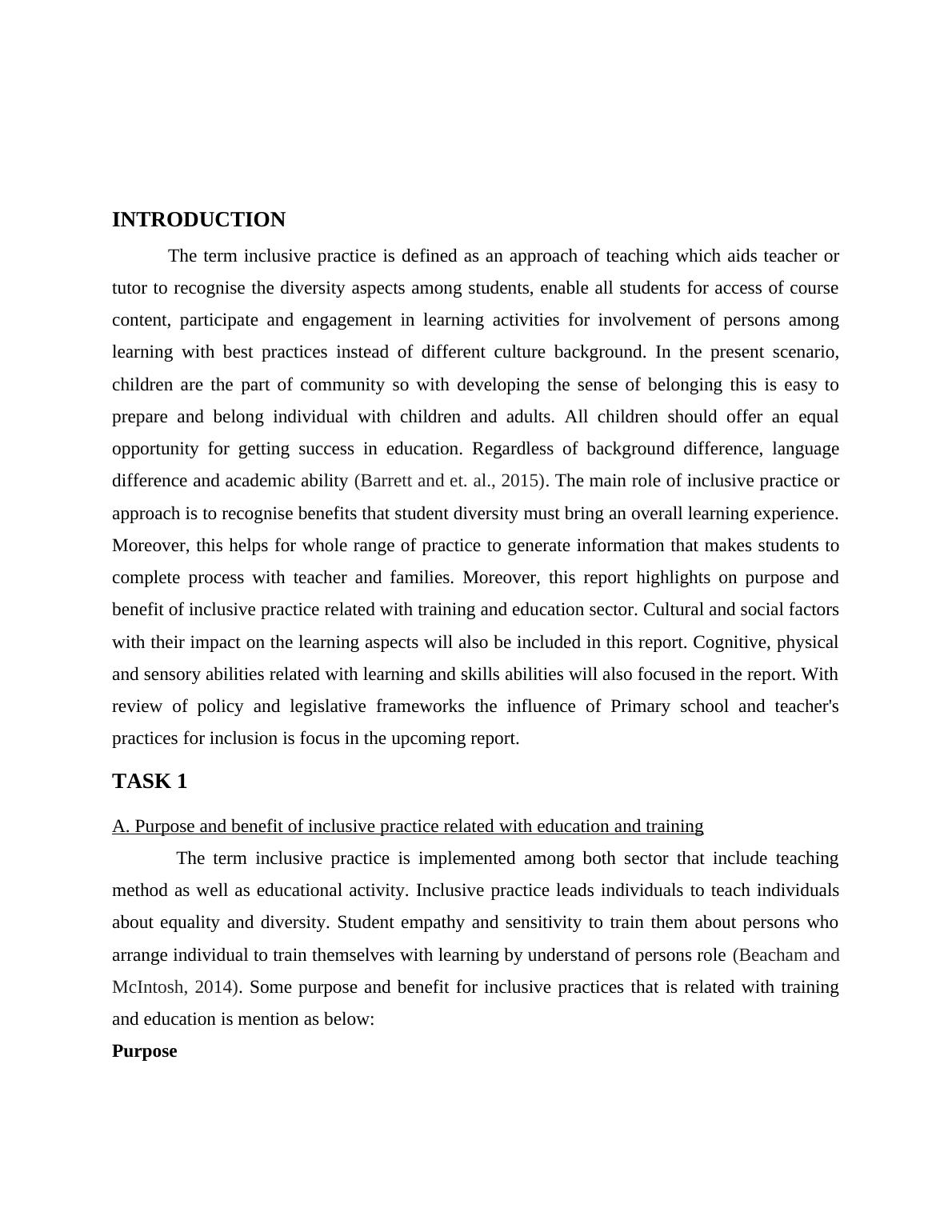
Assess to teaching methods- The time to reflect about teaching methods and practices
refers to way that are used for teaching individuals with different practices such as
method to teach individual about different learning practices. Educational background,
personality, likes, dislikes and opinion refers to the methods that are used to teach
individuals with right practices. With considering and identifying assess teacher easily
deliver lesson through designing process according to the planned activities.
Adopt and modify of content- teacher or individual focus on the lessons that are
related with diversity aspects and as per students requirements. Instructor modify the
content and convert them according to students or individual. This results it is easy for
persons to learn about content if it match with person requirement (Boggan, Grzanka
and Bain, 2017). The main aim of individuals is to make initiatives about diversity of
students. So another purpose of inclusive practice is to make lessons and transfer them
according to culture, religion and country base.
Benefit of inclusive practice
Embrace variety- Inclusive practice is formulate and aim towards the ensure of all
children aspects such as to reduce diversity related challenges as it flourish about
education, groups and change in culture aspects as it make flexible teaching methods.
This also work for pairs, groups and individual aspect which leads in completing task
according to the flexible approaches. With being flexible management focus on
different teaching methods that make strength for persons to manage work by solving
their problems related with learning. It benefit educator and learner to perform work
according to the situation.
Improvement in students relation- Their are different practices, legislation, rules and
regulations etc. are focused in the educational sector. In context of education this is
identified that inclusive practices leads persons to improve friendship, self-image and
confidence by improving collaboration among persons. It refers that inclusive practices
reduce challenges related with diversity that helps in generating better collaboration
among students that helps to treat all persons in an equal manner (Buli-Holmberg and
Jeyaprathaban, 2016). Thus, students are benefited because with reduce in challenges
students share a bond of friendship that improve person relations.
refers to way that are used for teaching individuals with different practices such as
method to teach individual about different learning practices. Educational background,
personality, likes, dislikes and opinion refers to the methods that are used to teach
individuals with right practices. With considering and identifying assess teacher easily
deliver lesson through designing process according to the planned activities.
Adopt and modify of content- teacher or individual focus on the lessons that are
related with diversity aspects and as per students requirements. Instructor modify the
content and convert them according to students or individual. This results it is easy for
persons to learn about content if it match with person requirement (Boggan, Grzanka
and Bain, 2017). The main aim of individuals is to make initiatives about diversity of
students. So another purpose of inclusive practice is to make lessons and transfer them
according to culture, religion and country base.
Benefit of inclusive practice
Embrace variety- Inclusive practice is formulate and aim towards the ensure of all
children aspects such as to reduce diversity related challenges as it flourish about
education, groups and change in culture aspects as it make flexible teaching methods.
This also work for pairs, groups and individual aspect which leads in completing task
according to the flexible approaches. With being flexible management focus on
different teaching methods that make strength for persons to manage work by solving
their problems related with learning. It benefit educator and learner to perform work
according to the situation.
Improvement in students relation- Their are different practices, legislation, rules and
regulations etc. are focused in the educational sector. In context of education this is
identified that inclusive practices leads persons to improve friendship, self-image and
confidence by improving collaboration among persons. It refers that inclusive practices
reduce challenges related with diversity that helps in generating better collaboration
among students that helps to treat all persons in an equal manner (Buli-Holmberg and
Jeyaprathaban, 2016). Thus, students are benefited because with reduce in challenges
students share a bond of friendship that improve person relations.
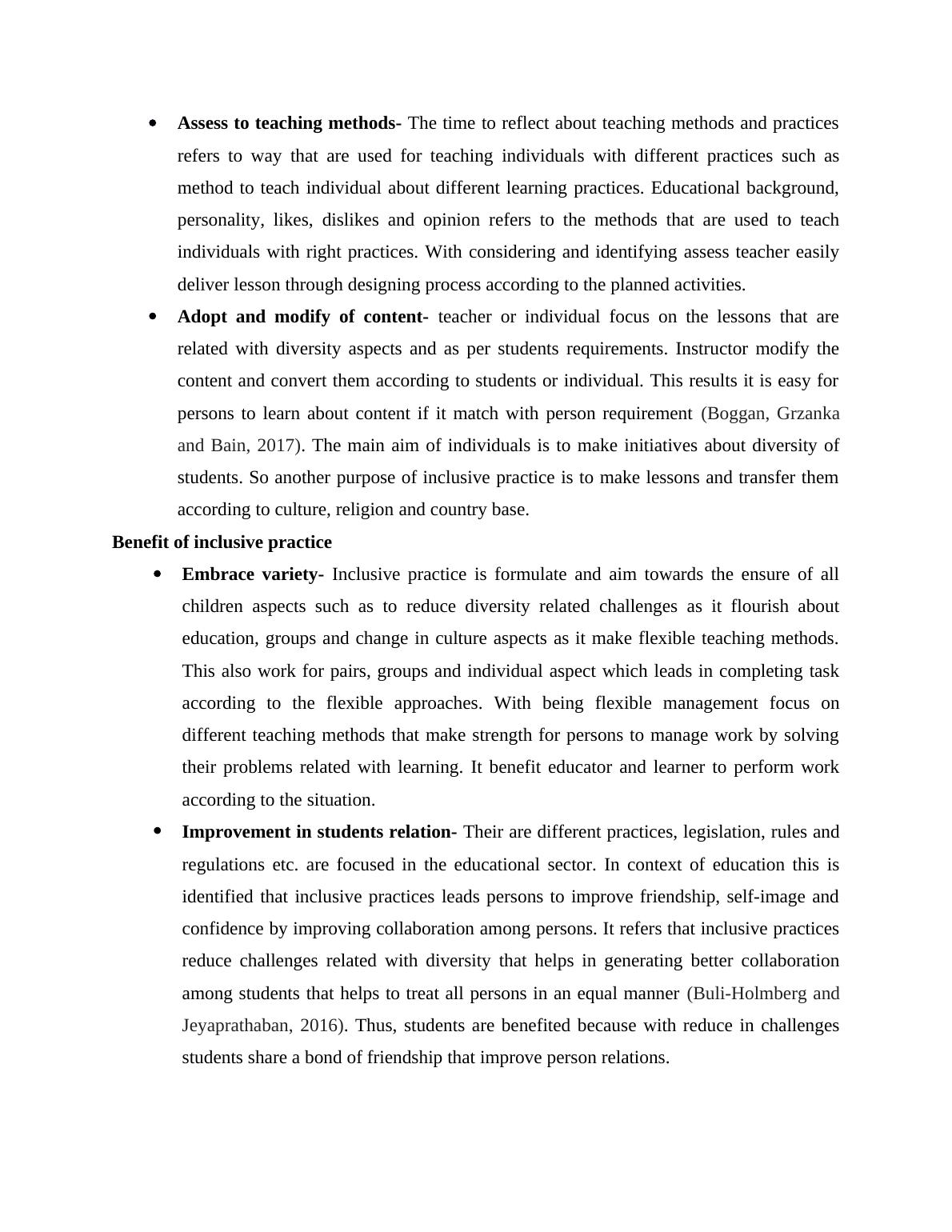
B. Explain social and cultural factors that impact on learning
With the study of different theories and policies it is identified that family characteristic,
community and background significantly impact on the children development and their Primary
school achievement. Impoverish culture knowledge of parents make it complex and difficult for
children to adopt new environment in an adequate manner. Some of the major challenges related
with social and culture factor are mention as follow:
Culture of the society- The term culture is a relative factor it refers that one culture is
approved and encouraged than another developed culture impacts on learning aspects of
students. Each culture formulate and adopt some value which is build up to strong their
community but for another those culture value is not legal. Example- Asian students less prefer
to consume non-vegetarian food items and it is because of their less value. Sub-culture define
and arrange the self-defense aspects among students (Florian, 2015). It work as a barrier for
persons because it is complex for individual to survive among violent ethnic groups. Therefore,
it is complex for persons to adopt behaviour as individual who eat vegetarian food face complex
situation to consume non-vegetarian food.
Religious challenges- Religion is one of the controversial issue for students like, in
Nigeria education the early stage related with missionary education is expected. This results that
controversy among students still exist. Apart from this, all such issue are raised because of
religion related challenges so it is a major problem for person to study on social topics.
Therefore, religious challenges is one of the major barrier which is generating complexity for
students to learn about different aspects. Social subject educator who teach and reside in areas
which is surrounded by religion area face complexity because of volatile factors. This also refers
that students who are at socialized as per religious family and communities face complexity to
generate belief and behave properly among Primary school. This create culture barrier for
students to learn and adopt new aspects.
Difference in language- Each country which is developed provide or offer education
within their common language. So international students who belong to different background
face barrier related with communication. In order to overcome from the barrier of difference in
language aspect students and educator interact with each other in a common language. Learners
belong to different social-culture exposure and most of the Primary schools are located in areas
where common and local language is more preferred (Gillett-Swan and Sargeant, 2019).
With the study of different theories and policies it is identified that family characteristic,
community and background significantly impact on the children development and their Primary
school achievement. Impoverish culture knowledge of parents make it complex and difficult for
children to adopt new environment in an adequate manner. Some of the major challenges related
with social and culture factor are mention as follow:
Culture of the society- The term culture is a relative factor it refers that one culture is
approved and encouraged than another developed culture impacts on learning aspects of
students. Each culture formulate and adopt some value which is build up to strong their
community but for another those culture value is not legal. Example- Asian students less prefer
to consume non-vegetarian food items and it is because of their less value. Sub-culture define
and arrange the self-defense aspects among students (Florian, 2015). It work as a barrier for
persons because it is complex for individual to survive among violent ethnic groups. Therefore,
it is complex for persons to adopt behaviour as individual who eat vegetarian food face complex
situation to consume non-vegetarian food.
Religious challenges- Religion is one of the controversial issue for students like, in
Nigeria education the early stage related with missionary education is expected. This results that
controversy among students still exist. Apart from this, all such issue are raised because of
religion related challenges so it is a major problem for person to study on social topics.
Therefore, religious challenges is one of the major barrier which is generating complexity for
students to learn about different aspects. Social subject educator who teach and reside in areas
which is surrounded by religion area face complexity because of volatile factors. This also refers
that students who are at socialized as per religious family and communities face complexity to
generate belief and behave properly among Primary school. This create culture barrier for
students to learn and adopt new aspects.
Difference in language- Each country which is developed provide or offer education
within their common language. So international students who belong to different background
face barrier related with communication. In order to overcome from the barrier of difference in
language aspect students and educator interact with each other in a common language. Learners
belong to different social-culture exposure and most of the Primary schools are located in areas
where common and local language is more preferred (Gillett-Swan and Sargeant, 2019).
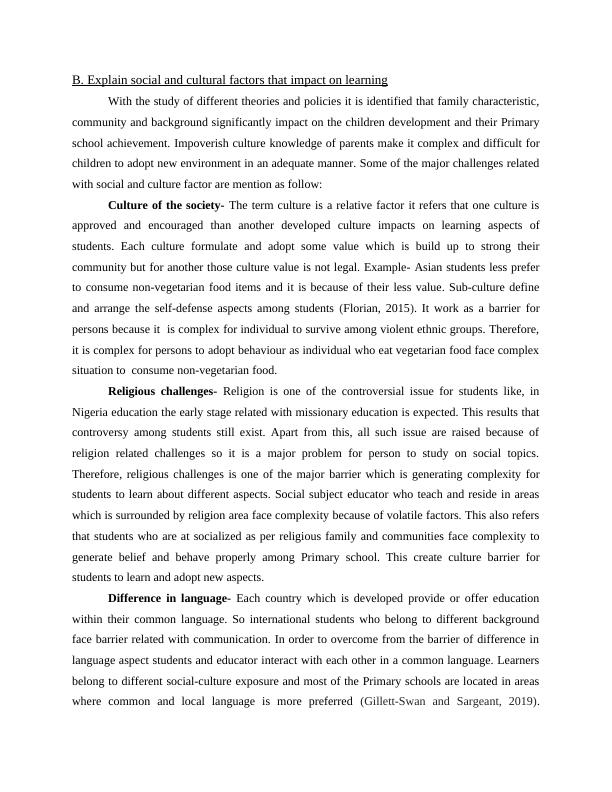
Therefore, change in language generate complexity like, social study students face challenges to
interpret the meaning of words within English language. Therefore, learners and educators both
face challenges because of inappropriate interaction due to change in language.
Multi-cultural education- This refers to an idea that is reform by the movement of
education and it is defined as a process by which management change or modify education
structure. Male or female student, culture groups, exceptional students and local students all are
different. So it is difficult for students to communi
C. Analyse the impact of different cognitive, physical and sensory abilities on learning
Cognitive factor define the characteristic of an individual which impact on performance
and learning of them. With the analysis of cognitive factor individuals and instructor modulate
performance to improve or decline the learning aspects. Attention, memory and reasoning are
some of the factors that are included in cognitive factor.
Sensory needs is to hear loss and visual impairment and sensory processing difficulties as
well as physical difficulties that occur due to variety of reason (Kim, Florian and Pantić, 2020).
The essential consideration in the area relates with degree by which difficulties impacts on the
child and young persons for providing opportunities related with education.
Impact of cognitive factor on learning
Cognitive factor and its aspects relates with internal factor of an individual and it support
the person to modulate behaviour and response towards external stimuli such as stress.
Performance related with different activities results that if an individual face challenges with its
response than it is complex to complete work as per daily activities. Executive function
demonstrate the ability for living independently. Therefore, behavioural response minimise stress
by making active about cognitive aspects. Thus, it impact on company because less executive
function generate complexity to deal with executive functioning. It results learners face difficulty
to manage work in a proper manner. Along with this due to less understanding of cognitive
factor it is complex to forecast appropriate learning methods so it is essential for primary school
to complete work in an organised manner.
Impact of sensory factor on learning
Another aspect that is impacting on learning relates with sensory and physical difficulties
and it refers student face challenges because of loss among sensorineural, mixed and conductive
perspective. Hearing loss generate challenges for students because learners are not able to
interpret the meaning of words within English language. Therefore, learners and educators both
face challenges because of inappropriate interaction due to change in language.
Multi-cultural education- This refers to an idea that is reform by the movement of
education and it is defined as a process by which management change or modify education
structure. Male or female student, culture groups, exceptional students and local students all are
different. So it is difficult for students to communi
C. Analyse the impact of different cognitive, physical and sensory abilities on learning
Cognitive factor define the characteristic of an individual which impact on performance
and learning of them. With the analysis of cognitive factor individuals and instructor modulate
performance to improve or decline the learning aspects. Attention, memory and reasoning are
some of the factors that are included in cognitive factor.
Sensory needs is to hear loss and visual impairment and sensory processing difficulties as
well as physical difficulties that occur due to variety of reason (Kim, Florian and Pantić, 2020).
The essential consideration in the area relates with degree by which difficulties impacts on the
child and young persons for providing opportunities related with education.
Impact of cognitive factor on learning
Cognitive factor and its aspects relates with internal factor of an individual and it support
the person to modulate behaviour and response towards external stimuli such as stress.
Performance related with different activities results that if an individual face challenges with its
response than it is complex to complete work as per daily activities. Executive function
demonstrate the ability for living independently. Therefore, behavioural response minimise stress
by making active about cognitive aspects. Thus, it impact on company because less executive
function generate complexity to deal with executive functioning. It results learners face difficulty
to manage work in a proper manner. Along with this due to less understanding of cognitive
factor it is complex to forecast appropriate learning methods so it is essential for primary school
to complete work in an organised manner.
Impact of sensory factor on learning
Another aspect that is impacting on learning relates with sensory and physical difficulties
and it refers student face challenges because of loss among sensorineural, mixed and conductive
perspective. Hearing loss generate challenges for students because learners are not able to
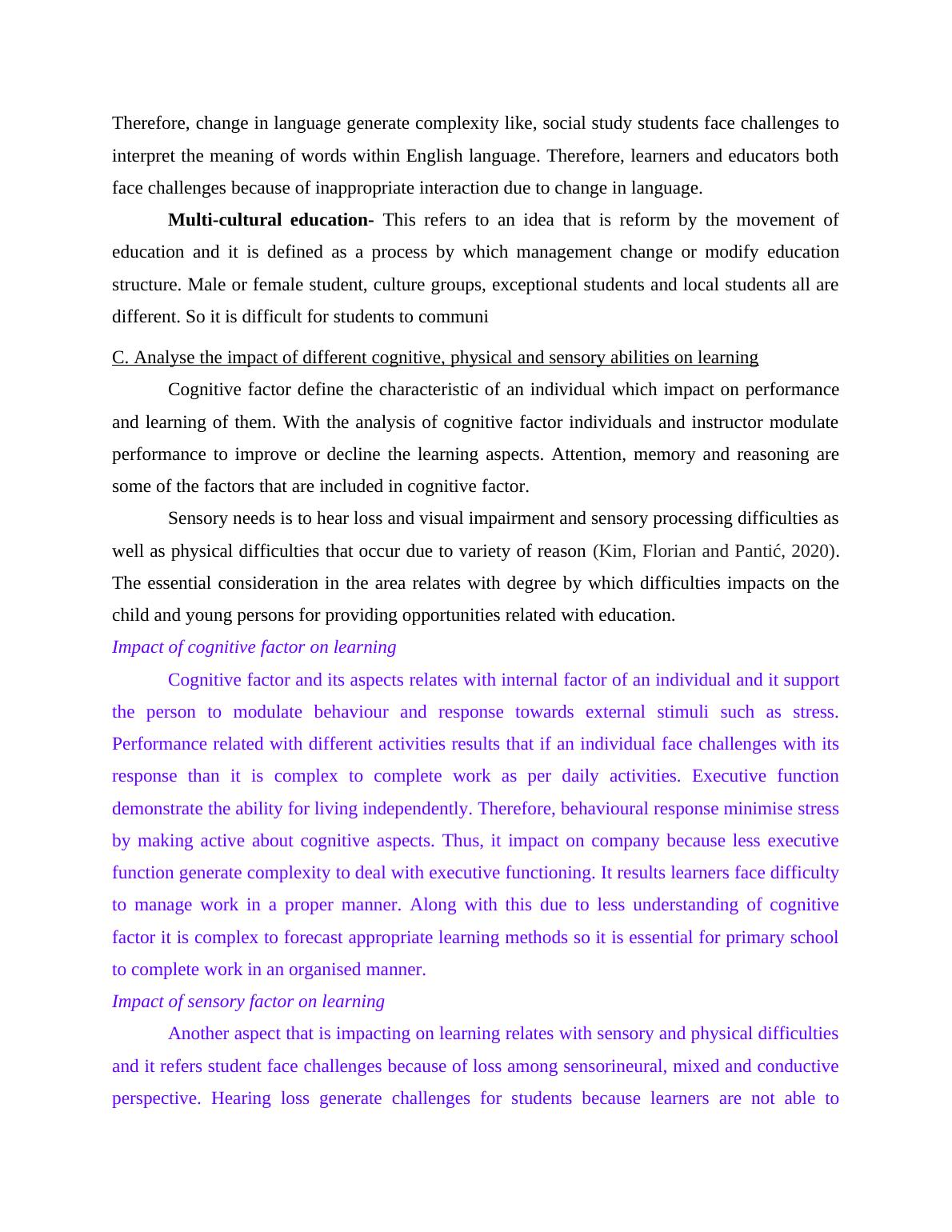
End of preview
Want to access all the pages? Upload your documents or become a member.
Related Documents
Importance and Benefits of Inclusive Practices in Education and Training Sectorlg...
|17
|6567
|85
Inclusive Practice: Purposes, Benefits, and Impact on Learninglg...
|18
|6214
|1
Inclusive Practice in Education and Training Sectorlg...
|19
|6475
|55
Inclusive Practicelg...
|20
|6785
|2
Inclusive Practice: Impacts, Policies, and Strategieslg...
|12
|3819
|43
Inclusive Practice in Teachinglg...
|16
|4560
|1
